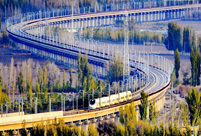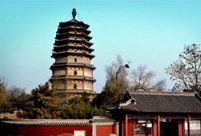


A seminar was held under the theme of 2016 China-Africa Cooperation Outlook at the University of Pretoria’s Gordon Institute of Business Science earlier this month. (Picture: People’s Daily Online/Sissy Cheung)
The International Monetary Fund (IMF) cut its economic growth forecast for SA to 0.7% last month, while most countries in sub-Saharan Africa might see growth rates that are lower than those seen over the past decade.
Some blamed the unfavourable situation on the slowdown in China’s economy.
“Indeed, the growth pace of China’s economy is gearing down. Yet around the globe, a growth rate of 6.9% on such an enormous base still rarely happened,” said Rong Yansong, the Chinese Economic and Commercial Counsellor to SA, speaking at a seminar held in Johannesburg earlier this month.
“China remains the largest engine for the global economy, with the contribution to the value add of the world economy accounting for more than a quarter, with Africa always having been one of main beneficiaries,” he added.
Under the theme of 2016 China-Africa Cooperation Outlook, the seminar at the University of Pretoria’s Gordon Institute of Business Science (GIBS) was organised by its newly established China-Africa Business Club.
As Rong pointed out, to sup- port a growth rate of close to 7%, China has been the main importer of commodities from the rest of the world. The volume of commodities imported by China from Africa has not declined; it is only the value that has dropped dramatically. This shows that the decline should be attributable to falling commodity prices instead of the weakening demand.
“This also shows how the development of the African continent in the past decade has been so heavily reliant on primary products,” Rong said.
There has been much misunderstanding, informed by far- fetched analysis and biased comments, on China’s involvement in local development. As the world’s second largest economy has become such a hot topic, it is rarely understood or further studied before being judged recklessly. Therefore the China- Africa Business Club was founded to act as a platform for dialogue between business leaders from China and Africa.
Ken Chun, founding chair- person of the club, was the only student from Mainland China when he was studying for his MBA at GIBS.
“Almost every single class I attended talked about China. But I was too shy to participate in class discussion then. Some classmates advised me to give my opinion on the Chinese rise to power. When I found that the mainstream local business com- munity still looked at Chinese investment quiet negatively, I realised that my role was important at GIBS.”
Chun introduced the club as a vehicle to build a sound business relationship between Africa and China through the top business school in Africa. This will connect young professionals and entrepreneurs, helping the business sectors of both sides to understand each other’s cultural values and differences, as well as facilitating business investment and entrepreneurship between them.
The club is endorsed by the Dean of GIBS, Professor Nicola Kleyn. “If we look at what’s required to produce inclusive growth on the African continent, there is absolutely no doubt that Africa can’t do this alone,” said Prof Kleyn.
She encouraged her alumni to pursue life-long learning. “The club is around communities that engage with common issues. Of course, government relationships are important, but at the end of the day it’s through the entrepreneurs and micro social relationships that we build stronger connections. And the club is where you can engage in relevant conversations.”
China Hisense’s Tony Shi, deputy GM of Hisense SA, was one of the speakers at the seminar. The electronic and home appliances manufacturer entered the South African market in 1996 and is currently distributing its products to more than 3,500 stores across SA. Besides expanding its presence in growing markets, Hisense remains committed to having a positive impact on these markets. Its manufacturing plant in Atlantis, Cape Town has created jobs for 700 locals, providing them with professional training and producing 1,700 televisions and 1,200 fridges daily.
Hisense is also working close- ly with the community through various campaigns from educational support to wildlife protection. “We offer affordable products of high quality, world class customer services and, in the same breath, we are down to earth. We are a brand that cares for people and we care for South Africans,” said Shi.
Though much has been done by the Chinese enterprises in SA, little has been publicised due to the humbleness so valued by its culture. Chun suggested at the seminar that they should get into marketing and engage with mainstream media to close the gap in misunderstanding.
He also advised Chinese executives and managers work- ing in SA to take MBA or executive programmes at GIBS in order to get involved with the local business people. “You can’t operate your business success- fully within just the small Chinese community and forget about the bigger environment out there in Africa,” he said.
Sam Ng, sharing his personal experience of doing business as an immigrant Chinese in SA, has been in the country for more than 20 years. His trading com- pany FLT has become a success that trades in six other African countries and creates thousands of jobs in SA. He mentioned that many more small and medium- sized companies are willing to explore the African market, and they are backed by municipal governments with great passion and incentive policies.
Another valuable function that the club provides is facilitating entrepreneurship, particularly among young business elites between Africa and China. Chun himself has just started up his own business, specialising in enterprise IT management and internet business in Africa. He recently launched a mobile gaming project in SA, Nigeria and Kenya.
As he said: “For those youth who are pursuing their entrepreneurial dreams between China and Africa, they are not alone, and they can find their peers at this club.”
(The story was originally published on Business Day on February 29th, 2016.)
 China has world's largest high-speed rail network
China has world's largest high-speed rail network Top beauties in Chinese provinces
Top beauties in Chinese provinces 600 people attend Lusheng playing contest in S China
600 people attend Lusheng playing contest in S China Engineer troop builds bridge in real combat conditions
Engineer troop builds bridge in real combat conditions You can urinate in public in Chongqing
You can urinate in public in Chongqing Rice terrace scenery in southwest China's Yunnan
Rice terrace scenery in southwest China's Yunnan 2016 Miss Chinatown USA pageant held in San Francisco
2016 Miss Chinatown USA pageant held in San Francisco Ancient pagodas across China
Ancient pagodas across China Wedding dress show up in the air
Wedding dress show up in the air Top 20 hottest women in the world in 2014
Top 20 hottest women in the world in 2014 Top 10 hardest languages to learn
Top 10 hardest languages to learn 10 Chinese female stars with most beautiful faces
10 Chinese female stars with most beautiful faces China’s Top 10 Unique Bridges, Highways and Roads
China’s Top 10 Unique Bridges, Highways and Roads Harris is making waves in S.China Sea
Harris is making waves in S.China Sea With new plant, Airbus seeks to secure China market share
With new plant, Airbus seeks to secure China market share Chinese sound off on America’s loudest presidential hopeful
Chinese sound off on America’s loudest presidential hopeful 40 years after Cultural Revolution, repentance of Red Guards is still rare
40 years after Cultural Revolution, repentance of Red Guards is still rareDay|Week